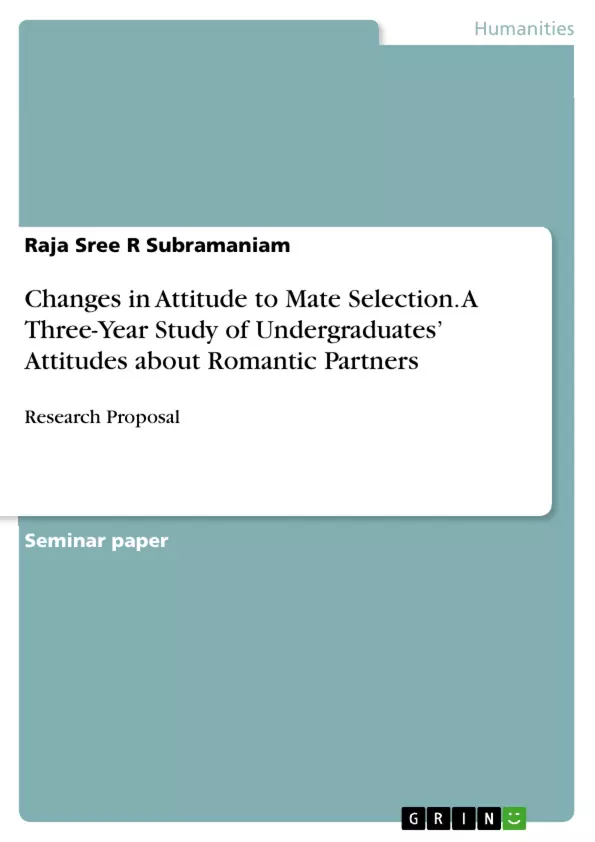The primary aim of the proposed study is to understand how individuals’ reports of attitudes towards mate selection change over a period of 1,095 days or approximately a three-year period. The secondary aim is to identify significant differences in the attitude about mate selection among four groups of religion: Islam, Buddhist, Christian and Hindu. The findings from this study would provide a strategy for the establishment of educational and counselling programs.
The research questions are:
What variables in attitudes about mate selection continue to evolve among the four groups of religions?
How do the four groups of religion vary in their attitudes about mate selection over time?
Inhaltsverzeichnis (Table of Contents)
- Introduction
- Literature review
- Evolutionary perspective
- Developmental perspective
- Social networks influence
- Relationship myths and attitude about mate selection
- Mate preference in Malaysia
- Hypothesis
- Methodology
- Design
- Participants
- Materials
- Procedures
- Data Analysis
- Ethical consideration
- Implication and Application
- References
Zielsetzung und Themenschwerpunkte (Objectives and Key Themes)
This study investigates how attitudes and beliefs about romantic mate selection among undergraduates in Malaysia change over a three-year period. It aims to understand how evolutionary, developmental, and social factors contribute to this process, particularly within a multicultural context.
- Evolutionary perspectives on mate selection
- Developmental stages and filters in romantic relationships
- Social networks and their influence on mate choice
- Cultural and religious factors impacting mate selection
- The role of relationship myths and unrealistic beliefs in mate selection
Zusammenfassung der Kapitel (Chapter Summaries)
- Introduction: The introduction outlines the importance of studying attitudes and beliefs about romantic mate selection, highlighting how unrealistic expectations can hinder relationship success. It introduces the study's objectives and the rationale behind examining these topics in a Malaysian context.
- Literature Review: This chapter explores the theoretical frameworks underlying mate selection, reviewing relevant research from evolutionary psychology, developmental psychology, and social network theory. It examines how cultural and social contexts influence mate choice, with a focus on cultural values and expectations within Malaysia.
- Evolutionary Perspective: This section delves into Darwin's theory of sexual selection and its application to mate selection. It explores the concept of heritable traits and parental investment, examining how these factors influence mate preferences. The chapter also discusses studies exploring gender differences in mate selection strategies.
- Developmental Perspective: This chapter focuses on stage and filter theories of relationship development, contrasting them with Darwin's perspective. It examines models that explain how compatibility and social attributes are evaluated throughout the stages of romantic relationships. The chapter also discusses social exchange theory and its limitations, along with research on homogamous relationships and the impact of personal beliefs on mate selection.
- Social Networks Influence: This section explores the significant role of social networks in shaping mate selection behaviors. It examines how social environments and cultural contexts influence values, perceptions, and beliefs, leading to variations in mate choice preferences across different cultures. The chapter also investigates the influence of parental investment, cultural stereotypes, and assortative mating on mate selection decisions.
- Relationship Myths and Attitude about Mate Selection: This chapter delves into the concept of relationship myths, exploring how unrealistic beliefs can impact mate selection decisions and contribute to relationship dissatisfaction. It examines how attitudes about relationships are shaped by childhood experiences, social norms, and emotional development. The chapter also highlights research on the impact of unrealistic romantic attitudes on relationship outcomes.
Schlüsselwörter (Keywords)
The key themes and concepts explored in this study include: mate selection, romantic relationships, evolutionary psychology, developmental psychology, social networks, cultural influences, relationship myths, unrealistic beliefs, interfaith marriage, and assortative mating.
Frequently Asked Questions
How do undergraduates' attitudes about mate selection change over three years?
The study tracks how beliefs evolve over a 1,095-day period, influenced by developmental stages and life experiences during university.
Do different religions influence mate selection preferences?
Yes, the research identifies significant differences in attitudes among students identifying as Muslim, Buddhist, Christian, and Hindu.
What are "relationship myths"?
These are unrealistic beliefs about romantic partners and relationships that can lead to dissatisfaction and hinder healthy mate selection.
What is the evolutionary perspective on mate selection?
It focuses on Darwin's theory of sexual selection, involving heritable traits and parental investment as drivers for choosing a partner.
What role do social networks play in choosing a partner?
Social networks, including family and peers, significantly influence individual values and perceptions regarding compatible mates.
- Citation du texte
- Raja Sree R Subramaniam (Auteur), 2013, Changes in Attitude to Mate Selection. A Three-Year Study of Undergraduates’ Attitudes about Romantic Partners, Munich, GRIN Verlag, https://www.grin.com/document/313309



